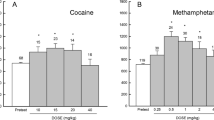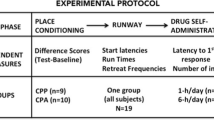Abstract
The effect of nimodipine (0, 0.1, 1.0 and 10 mg/kg, SC), a dihydropyridine L-type Ca2+ channel antagonist, on the establishment of cocaine-(10 mg/kg IP) conditioned place preferences (CPP) was investigated. Nimodipine produced conditioned place aversions (CPA) on its own; reductions in cocaine CPP are apparently due to this CPA. There is a high negative correlation between time spent in the CS+ compartment and the difference in locomotion rates between the CS+ and the non-drug (CS−) compartments, independent of drug effects. This relationship is responsible for an increased rate of locomotion observed in the CS− compartment in cocaine-conditioned rats. Analysis of covariance indicated that cocaine CPP occurred independently of cocaine’s effects on locomotion. Furthermore, cocaine produces an increase in the rate of locomotion in the CS+ compartment when time spent in this compartment is equated with time spent in the CS− compartment. This suggests that cocaine’s effects on CPP and “conditioned” locomotion are due to separate mechanisms of action. On the other hand, nimodipine-induced place aversions and locomotor rates are not independent of each other, indicating a common mechanism of action, or that one is a consequence of the other. It is concluded that place preferences and place aversions can sometimes be secondary to compartment-specific locomotor changes, and locomotion effects can be confounded by differential times spent in each compartment. The relationships between these two behaviours must be controlled for before conclusions of CPP or CPA can be drawn in drug conditioning studies.
Similar content being viewed by others
Author information
Authors and Affiliations
Additional information
Received: 25 January 1996 / Final version: 7 November 1996
Rights and permissions
About this article
Cite this article
Martin-Iverson, M., Reimer, A. & Sharma, S. Unbiased cocaine conditioned place preferences (CPP) obscures conditioned locomotion, and nimodipine blockade of cocaine CPP is due to conditioned place aversions. Psychopharmacology 130, 327–333 (1997). https://doi.org/10.1007/s002130050247
Issue Date:
DOI: https://doi.org/10.1007/s002130050247




